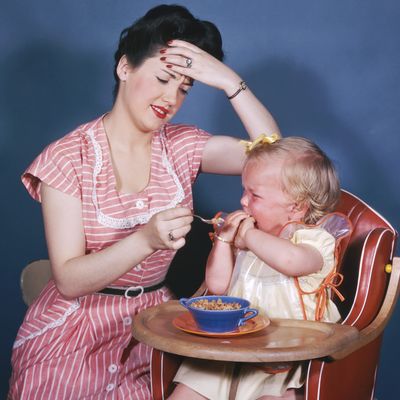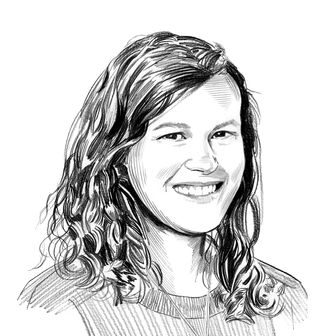
In interviews, Meghan Daum has presented her new anthology — Selfish, Shallow, and Self-Absorbed: Sixteen Writers on the Decision Not to Have Kids — as a necessary expansion of the cultural conversation around parenthood. “I think one of the problems with this discussion is that it gets boiled down to, ‘Ew, babies, gross,’ or, ‘Babies are the best thing in the world,’” she said on the Takeaway. “It’s not parents versus non-parents.” The book, which includes essays by writers like Lionel Shriver, Laura Kipnis, Anna Holmes, and Geoff Dyer, succeeds in presenting a diverse set of reasons for and attitudes about not having kids. Yet for a book that seeks to widen the conversation, it’s surprising how many of the essays rely on a particularly rigid notion of parenthood: that it’s unavoidably an all-consuming, soul-sucking, autonomy-killing endeavor.
Daum has suggested that people in the pro-kids camp may feel threatened by other people’s decision to forgo parenthood. As someone who’s interested in having kids someday, yet sympathetic to the significant burdens of child-rearing, it’s easy for me to accept that people who don’t want kids shouldn’t have them. I feel more threatened by the way these writers portray parenting — and the assumptions they make about the people who choose to do it.
Throughout the collection, a reader encounters the sentiment that a person could not in good faith have a child if they were not prepared to give that child “everything.” Numerous writers convey the sense that raising kids would totally consume them as individuals: thwart all personal goals and ambitions, and even their very sense of self. Lionel Shriver quotes a childless friend and accomplished journalist who tells her, “Had I had children, I would have written no books, nor would I have been a particularly successful journalist.” Anna Holmes expresses an overwhelming fear of what becoming a parent would prevent her from accomplishing: “I suspect that my commitment to and delight in parenting would be so formidable that it would take precedence over anything and everything else in my life; that my mastery of motherhood would eclipse my need for — or ability to achieve — success in any other arena.”
Others exalt the role of the devoted parent to a hyperbolic degree, describing the requisite dedication and selflessness in mythic terms. Recounting the prolonged ambivalence about parenting she experienced while trying to get pregnant via artificial insemination, Rosemary Mahoney writes: “I was beginning to realize that it was precisely that unavoidable, slavish, evolutionary devotion that worried me. I knew I would not be strong enough to resist it. I would become, to my discredit, entirely servile.”
These writers aren’t alone in characterizing parenting as a full-time job suited to only the most saintly, generous, and nurturing adults. The cliché fantasy of “having it all” (career, family, love …) has come in for reasonable scrutiny, with think pieces and trend stories pitting parenthood against other desirable adult pursuits: work, romance, travel, personal fulfillment, and happiness — the list goes on. “It takes all of you, and I don’t know that I want to give it all,” 27-year-old Leah Clouse, who doesn’t have kids, said of parenting in Time’s 2013 cover story “Having It All Without Having Children.”
It’s the vision of child-rearing as a life-defining pursuit that makes these writers wary. “Especially in the last couple of decades, the tasks around [parenting] have been ratcheted up,” says Daum. “It’s become professionalized in a way — you either leave it to professionals, or if you are a parent, you are going to perform it in a professional way.” (It’s worth noting, as Shriver does, that the characterization of kids as hothouse orchids is historically and culturally specific; after all, kids used to be a financial asset — extra farmhands — rather than a burden). The book is full of gleeful derision aimed at contemporary upper-middle-class parenting clichés: Baby Bjorns, fancy schools, organic snacks. Yet despite the writers’ contempt for this privileged, overbearing model of raising kids, many seem uninterested in imagining bringing up children any other way. Rather, they defensively uphold the assumption that kids need and deserve all of the time, money, and attention you can humanly provide, and if you’re not willing to make tremendous sacrifices to ensure that, maybe you should think twice about becoming a parent, too.
I have no qualms with the sentiment that parenting is a huge commitment, and one not to be undertaken lightly. But if the expectation is that to have a kid you have to be prepared to give up everything else — and commit yourself to a life of nothing but diapers, playgroups, and grown children who expect you to bankroll their gym memberships and mortgages — then of course it looks like a bad deal. Not to mention, the implication that people who choose to have children willingly sacrifice not only all their individual ambitions, but their existence outside their relationship to their kids paints a pretty limited, condescending picture of parenthood.
Maybe the root of the problem is our cultural obsession with assessing parents’ priorities — particularly women’s priorities — which we repeatedly use to make assumptions about their commitment as caregivers and professionals. “When Michelle Obama (to name one prominent, accomplished woman) announces ‘I’m a mother first,’ she is of course saying what people want to hear,” writes Sigrid Nunez, who points out that no one would ever expect the president to make a similar declaration. I’d think from that one might extrapolate that this binary is bogus — (why are we so averse to the idea that the First Lady could be equally committed to motherhood and other pursuits?) — but instead Nunez proceeds to quote Alice Munro’s confession in a Paris Review interview that she viewed her 2-year-old daughter as “the adversary to what was most important to me” (her writing). “Make no mistake,” Nunez declares, “this was a writer first.” But why should we maintain the idea that people — especially women — must choose only one or the other?
Writers like Nunez are quick to point out that historically, the majority of canonical female writers were childless — and that the realm of serious literature has, by and large, dismissed and ignored motherhood as a subject. But implicit in the assumption that women can either be primarily mothers or primarily writers is the dismissal of motherhood as the domain of uninteresting women. Nunez quotes Doris Lessing’s rationale for leaving her two young children: “There is nothing more boring for an intelligent woman than to spend endless amounts of time with small children.”
But surely there’s some middle ground between that scenario and forgoing parenthood entirely. In her essay, Holmes quotes Chirlane McCray on her transition into motherhood when her first child, Chiara, was born. “I was 40 years old. I had a life … the truth is, I could not spend every day with her. I didn’t want to do that,” she told this magazine last spring. “I love her … but I’ve been working since I was 14, and that part of me is me.” Holmes rightly points out that women who express complicated relationships to motherhood — or refuse to embrace it as their primary identity — still face social scrutiny. The New York Post was quick to interpret McCray’s comments as evidence that she was a “bad mom” — which seems as sure a sign as any that it’s time for the rest of us to stop upholding the same assumption. Personally, I’m looking forward to the day when mothers like McCray don’t feel like they have to be on the defensive for expressing that parenthood is just one facet — albeit an important one — of who they are.





